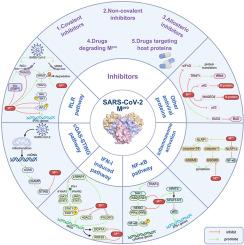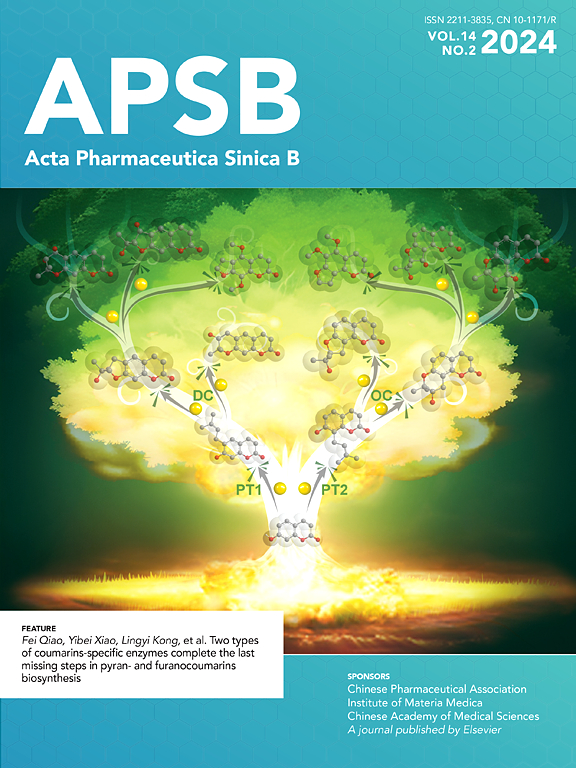The role of SARS-CoV-2 main protease in innate immune regulation: From molecular mechanisms to therapeutic implications
IF 14.6
1区 医学
Q1 PHARMACOLOGY & PHARMACY
引用次数: 0
Abstract
The main protease (Mpro) of SARS-CoV-2 plays a pivotal role in viral replication and immune evasion. Accumulating evidence highlights its significant role in suppressing innate immunity. In this review, we provide a comprehensive overview of how Mpro modulates host innate immune responses, including its interference with retinoic acid-inducible gene I (RIG-I)-like receptor (RLR) and cyclic GMP–AMP synthase (cGAS)–stimulator of interferon gene (STING) signaling pathways, inhibition of interferon production, and disruption of inflammasome activities. As a protease, Mpro cleaves a variety of host proteins to attenuate antiviral innate immunity, a process dependent on its catalytic dyad (Cys145–His41), which is crucial for its proteolytic activity. Meanwhile, Mpro also exerts innate immune regulatory functions in a protease-independent manner. Notably, inhibitors targeting Mpro have demonstrated efficacy in restoring immune functions and suppressing viral replication, offering potential therapeutic strategies against SARS-CoV-2 infection.

SARS-CoV-2主蛋白酶在先天免疫调节中的作用:从分子机制到治疗意义
SARS-CoV-2的主要蛋白酶(Mpro)在病毒复制和免疫逃逸中起着关键作用。越来越多的证据表明它在抑制先天免疫方面具有重要作用。在这篇综述中,我们全面概述了Mpro如何调节宿主先天免疫反应,包括其对视黄酸诱导基因I (RIG-I)样受体(RLR)和环GMP-AMP合成酶(cGAS)干扰素基因刺激因子(STING)信号通路的干扰,对干扰素产生的抑制,以及对炎性小体活性的破坏。作为一种蛋白酶,Mpro切割多种宿主蛋白以减弱抗病毒先天免疫,这一过程依赖于其催化双偶体(Cys145-His41),这对其蛋白水解活性至关重要。同时,Mpro也以蛋白酶不依赖的方式发挥先天免疫调节功能。值得注意的是,靶向Mpro的抑制剂已证明在恢复免疫功能和抑制病毒复制方面有效,为对抗SARS-CoV-2感染提供了潜在的治疗策略。
本文章由计算机程序翻译,如有差异,请以英文原文为准。
求助全文
约1分钟内获得全文
求助全文
来源期刊

Acta Pharmaceutica Sinica. B
Pharmacology, Toxicology and Pharmaceutics-General Pharmacology, Toxicology and Pharmaceutics
CiteScore
22.40
自引率
5.50%
发文量
1051
审稿时长
19 weeks
期刊介绍:
The Journal of the Institute of Materia Medica, Chinese Academy of Medical Sciences, and the Chinese Pharmaceutical Association oversees the peer review process for Acta Pharmaceutica Sinica. B (APSB).
Published monthly in English, APSB is dedicated to disseminating significant original research articles, rapid communications, and high-quality reviews that highlight recent advances across various pharmaceutical sciences domains. These encompass pharmacology, pharmaceutics, medicinal chemistry, natural products, pharmacognosy, pharmaceutical analysis, and pharmacokinetics.
A part of the Acta Pharmaceutica Sinica series, established in 1953 and indexed in prominent databases like Chemical Abstracts, Index Medicus, SciFinder Scholar, Biological Abstracts, International Pharmaceutical Abstracts, Cambridge Scientific Abstracts, and Current Bibliography on Science and Technology, APSB is sponsored by the Institute of Materia Medica, Chinese Academy of Medical Sciences, and the Chinese Pharmaceutical Association. Its production and hosting are facilitated by Elsevier B.V. This collaborative effort ensures APSB's commitment to delivering valuable contributions to the pharmaceutical sciences community.
 求助内容:
求助内容: 应助结果提醒方式:
应助结果提醒方式:


